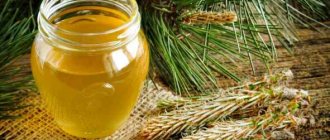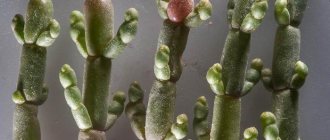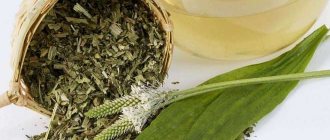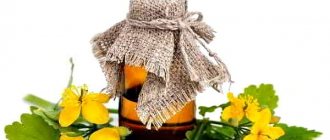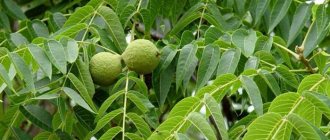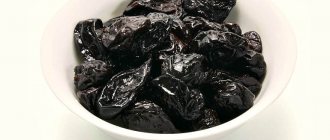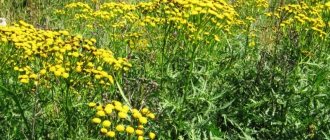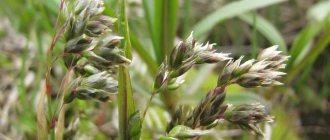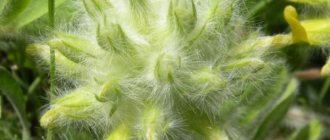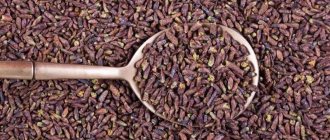What is horsetail?
At the moment we are interested in horsetail or common horsetail.
In Latin the herb is called Equisetum arvense. It is a common perennial plant native to Asia, Europe and North America. It is mainly found in regions with temperate climates.
In most countries, horsetail is considered a weed, so it doesn't have any amazing uses. But you can still extract medicinal benefits from it.
The grass itself reaches a height of 30 cm in height. Prefers to grow in moist and sandy soils.
Horsetail has one peculiarity. It manifests itself in the difference in stems depending on the season of the year. In spring, the main hollow stem is straight and somewhat reminiscent of an asparagus stem. But in summer the stem is very thin, green and feathery.
The plant also has no leaves. Instead, thin, sterile stalks or stalks sprout from the main stem. They cover the entire plant. Each leg is a little like a needle, because it ends at the end with a sharp point.
Harvesting usually occurs in the summer months. Then the stems are carefully selected and dried for storage.
Chemical composition
The unique chemical composition of horsetail (the above-ground part of the plant) determines its medicinal properties:
- carbohydrates (galactose, pectin, mannose, glucose, arabinose, xylose);
- resins;
- saponins (equisetonin, etc.);
- carotene;
- vitamin C;
- mineral salts;
- tannins;
- silicic acid salts;
- flavonoids (kaempferol-3-sophorazide, 5-glucoside-luteolin, quercetin-3-glycoside, apigenin-5-glycoside, saponaretin, dihydroquercetin and others);
- alkaloids (nicotine, trimethoxypyridine, equisetin, dimethylsulfone);
- organic acids (nicotinic, malic, quinic, aconitic, oxalic, fumaric, gluconic);
- phenolcarboxylic acids (vanillic, gallic, protocatechuic, ferulic, caffeic),
- fatty oil (contains campesterol, β-sitosterol, isofucosterol);
- bitterness.
All chemicals together determine the complex therapeutic effect.
- Thus, the herbal preparations of the plant are superior to renal preparations in terms of diuretic effect, have pronounced hemostatic and anti-inflammatory properties, improve the proliferation of connective tissue, accelerate tissue regeneration, especially during the tuberculosis process, activate the activity of the adrenal cortex, and normalize phosphorus-calcium metabolism.
- Flavonoids determine antimicrobial and anti-inflammatory effects;
- Horsetail helps remove lead from the body;
- Silicon compounds improve the course of metabolic processes and the condition of connective tissue, vascular walls and mucous membranes. Silicic acid salts play a special role in the development of bone tissue. In urine, these compounds prevent the crystallization of salts and the formation of stones.
- A strong diuretic effect makes the plant effective for weight loss, but it should be remembered that minerals are also washed out with excess liquid, so you should not abuse herbal diuretics. In addition, relying only on herbal preparations for the purpose of losing weight is not advisable.
Properties of horsetail herb
Horsetail was mentioned in ancient times by Avicenna in his works. Horsetail was used as a unique hemostatic and cleansing agent. In the Soviet Union, the study of horsetail began in the 40s of the twentieth century. In Russia, the effect of horsetail is still being studied at medical universities: for example, in 2008, the antitoxic, strong diuretic (diuretic), antiexudative, antifungal effect of horsetail extract was proven, and an antispasmodic effect was noted. Horsetail has:
- astringent,
- hemostatic,
- diuretic,
- anti-inflammatory effect,
- helps remove lead from the body in case of lead poisoning
Animal experiments have shown that horsetail reduces blood sugar levels in diabetes mellitus. Silicic acid and its salts are very important for most tissues of living organisms: they affect the synthesis of collagen (cartilage tissue) and the formation of bone tissue. Therefore, an infusion of horsetail herb can be used for pathologies of joints and cartilage tissue, and for spinal hernias. However, large doses are not recommended to avoid silicosis.
Horsetail grass cannot be used for a long time.
In official medicine, horsetail preparations are used for inflammatory diseases of the urinary tract and kidneys, and in the presence of urolithiasis. It is noteworthy that horsetail is superior in strength to kidney tea. However, horsetail preparations are contraindicated for nephritis and nephrosonephritis, because may cause kidney irritation. As a diuretic, an infusion of horsetail herb is used for congestion (edema), heart failure, and pulmonary failure. Horsetail herb is used in complex preparations for pleurisy and hypertension. As a hemostatic agent, horsetail herb is used for hemoptysis due to tuberculosis and uterine bleeding.
Horsetail is included in the anti-asthma medicine according to Traskova’s prescription. An infusion of horsetail herb is used to wash purulent wounds, treat furunculosis, trophic ulcers, hemorrhoidal bleeding (make lotions with a cold infusion). An infusion of horsetail herb is used as a rinse for tonsillitis, stomatitis, and nosebleeds.
In cosmetology, an infusion of horsetail herb is used for thinning hair, as a mask for acne, and for oily facial skin. In case of baldness, horsetail silicon is deposited near the hair roots and promotes their growth.
Previously, an infusion of horsetail herb was widely used by printers to cleanse the body of lead salts.
Modern pharmacologists recommend horsetail preparations for weight loss, as having a beneficial effect on metabolism, normalizing water-salt balance, removing toxins in the urine, in the form of complex preparations for atherosclerosis, for detoxification in hepatitis, and is widely used externally in cosmetology.
Horsetail preparations:
- liquid extract in cosmetology for skin and hair care
- horsetail is included in the “Fitolysin” paste, which is used internally for kidney diseases
- horsetail herb in the form of infusion, decoction, teas, alcohol tincture, extract, ointment is used in official and folk medicine for various diseases
Most often, horsetail herb is used as part of preparations. Fees are selected individually after consultation with a doctor.
Horsetail decoction We pour 4 tablespoons of dry horsetail herb with 1 cup of boiling water in an enamel bowl. You need to cook in a water bath from the moment of boiling for 30 minutes, cool for 10 minutes, strain. Drink horsetail decoction 1/3 cup 3 times a day 1 hour after meals. The course is only 3 weeks. Horsetail preparations should not be taken continuously for a long time to avoid silicosis.
Infusion of horsetail: 2 tablespoons of dry horsetail herb, pour 0.5 liters of boiling water in a thermos, leave for 1 hour. Take 1/2 glass 10 minutes before meals 4 times a day.
A contraindication for the use of horsetail herb is
- pregnancy,
- breastfeeding (lactation),
- severe kidney diseases (nephritis, nephrosis),
- individual intolerance (allergy).
It is important to remember that horsetail contains substances that can cause harm to health if overdosed. Consult your doctor before using horsetail, follow the dosage and course of treatment.
Indications for use
Horsetail is good for a stuffy nose
Horsetail for adenoids in children is used to treat runny nose and sinusitis. Indications for use are as follows:
- persistent runny nose and allergic rhinitis;
- bacterial sinusitis and sinus inflammation;
- a sore throat;
- rinsing the nose.
Treatment of adenoids with horsetail is carried out in several ways. In addition to rinsing the nose and using the decoction as drops, the medicine can be taken orally to strengthen the immune system. However, in this case, it is recommended to consult a doctor. In addition, decoctions of medicinal plants are not recommended for children under 3 years of age.
Using horsetail at home
Folk herbalists have collected many time-tested recipes from horsetail. Some healers distinguish horsetail from a number of medicinal plants as an anti-inflammatory and expectorant for coughs. Others note the leading diuretic property of the herb. Still others recommend it as an external antiseptic.
Pharmacy drugs
What medications can you buy at the pharmacy?
- Liquid extract of horsetail. This drug is often used in cosmetology, for hair and facial skin care. It is also added to oil for anti-cellulite and lymphatic drainage massage.
- Horsetail in the composition of Marelin tablets. A well-known drug in urology, which is prescribed for urolithiasis. It has anti-inflammatory, antispasmodic properties, reduces pain during renal colic and stone removal. The drug received positive reviews from doctors. In addition to horsetail, it contains: extracts of goldenrod and madder, magnesium phosphate, salicylamide, kellin, korglykon. Repeated courses of treatment are usually prescribed to prevent urolithiasis.
- Herb in capsules. The capsules contain 400 mg of horsetail extract. Taken for swelling associated with renal and heart failure, as well as for cystitis and urethritis. In addition to its diuretic effect, the herb has antimicrobial and detoxifying properties. Capsules are prescribed to cleanse the blood and body of toxins, to improve metabolic processes, normal development of bone tissue, and rapid healing of bones after fractures.
- Horsetail grass. The instructions indicate the main pharmacological action - diuretic. It is sold in the form of crushed raw materials in packages of 50 or 100 g. The grass is also packaged in the form of filter bags or in the form of pressed briquettes.
- Homeopathic medicines. Another type of plant is widely used in homeopathy - wintering horsetail. Medicine is made from it in the form of granules and essences. Main indications for use: cystitis, urethritis, colic, stones, urinary incontinence, blood in the urine, difficulty excreting urine, uric acid diathesis.
Decoction
The decoction is primarily used as a diuretic for kidney and heart failure. More concentrated decoctions can be used externally as an antiseptic and anesthetic.
Preparation
- Take 1 tbsp. l. dry raw materials.
- Pour a glass of boiling water.
- Boil for 1 minute.
- Leave for 30 minutes.
- Strain.
This decoction relieves swelling well. It is taken 1 tbsp. l. 4 times a day in repeated courses. Let us emphasize once again: it is important to consult a doctor before taking the decoction to rule out nephritis and nephrosis (for these diagnoses, the herb is strictly contraindicated).
Infusion
The infusion is indicated for all the diagnoses mentioned above. It can be prepared cold or hot.
Preparation of cold infusion
- Take 3 tbsp. l. dry raw materials.
- Pour in 2 cups of cold water.
- Insist for a day.
- Strain.
This infusion is recommended to be added to medicinal baths for skin diseases, rheumatic and joint pain. The infusion is also used for compresses, rinsing, and lotions.
Preparation of hot infusion
- Take 1 tbsp. l. raw materials.
- Pour a glass of boiling water.
- Leave for 30 minutes.
- Strain.
This infusion can be taken orally in the same dosage as the decoction. It is also used externally.
Tea
The famous German herbalist and pharmacist Mannfried Palou recommends drinking horsetail tea for respiratory diseases, as well as for their prevention. You can prepare a drink only from horsetail (take 1 cup of boiling water for 2 teaspoons). But it is better to drink the herb together with other medicinal plants.
Preparation
- Mix 10 g each of horsetail, linden blossom, plantain, mallow flowers and 5 g each of thyme, elderberry and fennel.
- Take 2 tsp. mixtures of herbs.
- Pour a glass of boiling water.
- Leave for 15 minutes.
- Strain.
This is an effective cough remedy and strengthens the immune system. You can drink 2 cups a day during flu and ARVI epidemics for prevention.
Alcohol tincture
Most often, the tincture is made with wine. It is shown as a general tonic, cleanses the blood, restores blood circulation, and improves metabolism. It is also recommended for complex treatment of tumors of the digestive organs.
Preparation
- Take 20 g of herb.
- Pour in a liter of white wine.
- Insist for a week.
- Strain.
Take 2 tablespoons on an empty stomach for several weeks. It especially helps with internal bleeding. There are many positive reviews about horsetail as a hemostatic medicine. However, it is best to use fresh plant juice to stop bleeding.
Ointment
It is used as an external antiseptic and wound healing agent.
Preparation
- Take 1 part of the powdered raw material.
- Add 4 parts fat (pork, goose, butter, Vaseline).
- Stir.
This mixture is used to lubricate purulent wounds, ulcers, and cracks.
Cosmetology
Horsetail for hair. Herbal decoctions prevent hair loss, accelerate hair growth, strengthen hair follicles and structure, prevent the development of seborrhea, fungal diseases, and the formation of dandruff. To obtain a therapeutic effect, rinse your hair with herbs after each hair wash for a month. Masks are also made from decoctions and infusions, which are rubbed into the scalp.- For facial skin. In cosmetology, the herb is valued for its anti-aging properties. It stimulates collagen biosynthesis and metabolism, ensures the strength of connective tissue, and smoothes out fine wrinkles. That is why horsetail extract is so often included in anti-aging cosmetics. Lotions and tonics from infusions are used to wipe acne, suppuration on the skin, and inflamed acne. The herb relieves irritation well, eliminates excess oil, so it is suitable not only for mature, but also young skin.
Features of use in women, men, children
- For women. The herb is most often prescribed in a medicinal mixture to stop uterine bleeding. Horsetail is also prescribed during pregnancy, especially in the last trimester for edema. However, the use of the herb in pregnant women is recommended only after consultation with a doctor. Nursing mothers can treat cracked nipples with decoctions.
- For men. The herb is most often used in hair care, to prevent baldness and strengthen hair. In combination with other herbs, horsetail stimulates sexual activity, increases potency, and treats inflammatory processes in the genitourinary organs.
- For children. It is important to remember that in young children, the use of diuretics can lead to the risk of dehydration, leaching of trace elements and other beneficial substances from the body. Long-term internal use of horsetail-based medications should be under the supervision of a physician. External use does not cause any concern if there is no allergy to grass. The use of horsetail for adenoids in children and the treatment of cough also require medical supervision. The herb is not recommended for children under 3 years of age.
The main use of horsetail is for diseases of the urinary system, respiratory and digestive organs. It is an effective diuretic, antispasmodic, and detoxifying agent. Heals wounds well, helps with rheumatic and gouty pain, stimulates metabolism and the functioning of blood vessels, cleanses the blood, stops bleeding.
Contraindications to the use of horsetail
Drinking a drink such as horsetail tea also has some contraindications. This is due to the fact that almost every medicine and plant, even of completely natural origin, cannot be used for absolutely all types of people. For example, horsetail tea is not recommended for people who have diseases such as acute nephritis and nephrosis, as well as other kidney diseases. This is due to the fact that preparations from this plant, including tea, can cause irritation to the kidneys. Also, a drink made from horsetail is not recommended for women to drink during pregnancy. Before use, be sure to consult a doctor.
We advise you to read: Matum tea from Thailand: what it is, brewing methods and healing qualities
Contraindications to treatment and precautions
The contraindications are as follows:
- Nephritis and nephrosis;
- Heavy internal bleeding;
- Pregnancy (causes uterine contractions);
- Lactation;
- Children under 3 years of age;
- Individual intolerance.
You cannot take medications from this plant for more than 3 months in a row. It contains the enzyme thiaminase, which breaks down vitamin B1, so the use of horsetail preparations for more than 3 months leads to the development of a deficiency of this vitamin. The potassium content in the blood also decreases, which, coupled with a pronounced diuretic effect, leads to hypokalemia, so this indicator should be monitored during treatment. Incompatible with lithium drugs - it slows down their natural elimination from the body, which is fraught with the development of side effects.
The use of horsetail must be agreed with the attending physician - only this is a guarantee of safe and effective treatment.
Possible harm and contraindications
Not everyone can use horsetail for weight loss. There are a number of absolute contraindications, in the presence of which the plant should be excluded from the diet:
- inflammatory processes in the kidneys, including nephritis, nephrosis;
- the use of medications aimed at reducing blood pressure or urine excretion;
- the period of bearing and feeding a child;
- uterine bleeding resulting from termination of pregnancy;
- childhood.
Indications and contraindications for the use of horsetail for weight loss
The medical community generally has a positive attitude towards the use of horsetail for weight loss and treatment. But doctors warn that independent use of this plant without prior consultation with a specialist can lead to complications such as:
- dehydration of the body;
- the occurrence of allergies;
- formation of salt stones in the kidneys.
To ensure that horsetail has only a beneficial effect, it is better to first talk to your doctor. He determines the individual dose. After all, if you abuse the plant, you can get poisoned, as it contains toxic substances.
Watch the video about the beneficial properties of horsetail:
Horsetail decoction causes the following side effects
Horsetail is an herb that has been used as a traditional remedy for a long time. It has a lot of advantages, but it is still worth taking some precautions.
Limit consumption of horsetail tea for a short period of time. Taking it for too long will definitely cause kidney irritation.
Due to its diuretic effect, tea helps reduce potassium levels. Moreover, this happens at a faster rate than the actual entry of this element into the body. As a result, you may experience muscle weakness and irregular heartbeat. Be sure to check your potassium levels and adjust your diet accordingly.
A decoction of horsetail in large doses can cause a deficiency of vitamin B1 (thiamine). You may need to find additional sources of this vitamin. Otherwise, you will experience a loss of strength and coordination. It is especially dangerous to drink alcohol with such herbal tea at the same time.
For topical use of the decoction, you need to test for allergies on a small area of the skin. If you experience skin irritation or rash, stop using it.
One of the elements present in horsetail is nicotine. Therefore, taking this tea in large quantities may lead to toxicity-like symptoms. These include nausea, muscle weakness, fever and even irregular heartbeat.
The same applies to taking lithium supplements. Horsetail decoction can affect the removal of lithium from the body.
Use of horsetail during pregnancy
If you are pregnant or breastfeeding, it is better to find an alternative solution. Horsetail tea contains small amounts of nicotine. It is highly discouraged at this stage of your life.
Likewise, horsetail decoction is not safe for children. Traces of nicotine make it unsuitable for very young children. For the same reason, horsetail tea should not be taken while breastfeeding. At best, it will make your milk less flavorful to your baby. And at worst, it can even cause harm.
Proven recipes: preparation and use
The best option is to include the swamp column in the collections. Herbalists offer several recipes with horsetail for the treatment of urinary tract diseases. A positive result of therapy is noted by many patients with signs of chronic pyelonephritis, swelling in the legs, urolithiasis, nephrolithiasis, and urination problems.
Recipes:
- to dissolve kidney stones. In the morning, steam a teaspoon of horsetail in 200 ml of boiling water. The infusion is ready in a third of an hour. It is important to drink the composition on an empty stomach, and after half an hour eat foods that are not heavy on the stomach. The course of treatment lasts two to three months; it is not advisable to skip taking the drug in the morning. After 30-40 days, sand will appear in the urine, the kidneys will gradually clear of salt deposits,
- with atony of the bladder. Patients suffering from problems with urine excretion, especially with prostate adenoma, note the effectiveness of baths with herbal decoction. It is simple to prepare a remedy with marsh column for bladder atony: for a sitz bath, take 250 g of plant shoots, combine with a liter of water, boil over low heat for an hour, strain. Pour the finished composition into the bath. Duration of the session – a third of an hour,
- to cleanse the kidneys. Take 25 g of yarrow, horsetail, St. John's wort, add 20 g of bean pods, dry or fresh blueberry leaves. Combine the ingredients, place a tablespoon of the mixture in a glass, pour in lukewarm water, and leave for six hours. Next, boil the product (no more than a quarter of an hour), cool, remove the plant material, drink at once. Repeat the course of treatment 3 times a week, the interval between courses is 7 days,
- to reduce pain and sting when urinating. Components in equal proportions: chamomile and bog column. For half a liter of boiling water, traditional healers advise taking three dessert spoons of the herbal remedy. The infusion is ready after 60 minutes. For a week, drink 150 ml of infusion daily, be sure to, in the morning, at lunchtime and no later than 16-17 hours,
- with chronic pyelonephritis. You will need violet, motherwort, St. John's wort and horsetail, 25 g of all ingredients. Prepare a decoction from the ratio of 1 part plant material + 20 parts boiling water. Infuse the herbal remedy for an hour. For chronic inflammation, drink a third of a glass of herbal tea three times a day,
- to dissolve stones in the urinary tract. Medicinal plants: mint + calamus rhizomes + juniper and rose hips + elderberry flowers + shoots of horsetail. Take more of all components except elderberry and juniper (10 g each is enough), 15 g each. Prepare a multi-component mixture in the same way as in the previous recipe. Drink 100 ml of the healing drink in the morning and at lunch, a third of an hour before meals.
Three more recipes:
- in chronic inflammatory processes in renal tissue. Collecting equal parts of birch leaves and horsetail shoots has a positive effect on the condition of problem areas. To enhance the anti-inflammatory effect, herbalists recommend combining not two components, but three – adding the same number of marigold flowers. Prepare the infusion at the rate of 20 parts boiling water and 1 part plant material. After 45 minutes, the anti-inflammatory, diuretic agent is ready. Drink half a glass every day for two weeks, frequency – three times a day,
- herbal mixture for inflammation in the urinary tract (chronic form of pathology). Take 40 g of plantain, 30 g each of horsetail grass and cinquefoil rhizomes. Select 3 teaspoons of medicinal raw materials, place the crushed components in a thermos, pour in boiling water (according to the recipe, 500 ml), leave the collection for an hour and a half. Take the strained product for chronic cystitis, pyelonephritis, urethritis, painful urination, 150 ml. Unlike most herbal remedies, drink the healing remedy an hour before bedtime for 10 days, then stop taking it for a week, then repeat the course,
- herbal remedy with anti-inflammatory, antimicrobial effect. For preparation, herbalists advise taking all the proposed components: a positive result is manifested in most cases. What you need: fennel fruits, cat's tail shoots, nettle leaves &ndash, 10 g each, steel grass roots and birch leaves &ndash, 15 g each, calendula flowers and yarrow leaves &ndash, 20 g each are enough. Proportions for preparing the herbal remedy: 1 part herbal mixture plus 20 parts hot water. Boil the mixture for three minutes, then leave until it cools down. Doctors recommend drinking 50 ml of the strained drink before breakfast, lunch and afternoon tea as a diuretic and anti-inflammatory agent.
Reviews of the use of horsetail for the treatment of kidney pathologies and urolithiasis most often confirm the effectiveness of the medicinal plant. It is important to know the beneficial properties of the shoots and the rules of use in order to prevent negative effects during herbal medicine. In case of acute inflammation, detection of large salt deposits, nephrosis and nephritis, doctors recommend plants with a “milder” effect.
The healing properties of horsetail have been known since ancient times. Learn about the effectiveness of using herbal remedies for the treatment of kidney and bladder diseases from the following video:
Medicinal properties of the plant
Since ancient times, this representative of the flora has been used to treat various diseases. Horsetail has medicinal properties that will help not only for weight loss, but also in the following cases:
- The diuretic effect helps get rid of edema and gout. To treat these problems, the medicinal plant is used in the form of an infusion or decoction.
- Horsetail has disinfectant properties. It will help improve the condition of skin diseases, as well as dysentery. Extract is used.
- Horsetail is good for hypertension, as it lowers blood pressure. Used as an infusion or decoction.
- The ancient plant has a pronounced anti-inflammatory effect. It can be used for pathologies of various organs: bladder, pharynx, bronchi, eyes. Inflammatory processes are treated with decoctions that can be taken orally or made into compresses.
- An extract of a medicinal plant is used to stop bleeding of various natures.
- Because horsetail has the ability to detoxify, it can be used to treat lead poisoning. The extract will free the body from this metal.
- Can be used for cosmetic purposes. Various baths and masks are made using horsetail to strengthen hair and nails.
- Decoctions and infusions are used for various stages of obesity, as they help normalize metabolism.
- Herbal tea from horsetail is good for diabetes.
Plant preparations are characterized by a number of positive effects: antimicrobial, hemostatic, anthelmintic, diuretic, antispasmodic, astringent, expectorant, antiseptic, restorative, wound healing.
This allows horsetail to be used with health benefits for a number of diseases:
- inflammatory processes in the oral cavity: periodontal disease, gingivitis, stomatitis, tonsillitis. Horsetail is also prescribed for adenoids; it helps eliminate inflammation, swelling and restore breathing.
- fungal infections caused by Trichophyton mentagrophytes, rubrum, Aspergillus niger, Microsporum canis;
- Qatar of the upper respiratory tract, chronic bronchitis and bronchial asthma;
- IHD;
- pathologies of the musculoskeletal system: radiculitis, arthritis, arthrosis, osteochondrosis, bone fractures;
- duodenal ulcer, cholecystitis and chronic cholangiocholecystitis, pancreatitis;
- metabolic pathologies (gout, mild and moderate forms of diabetes), excess body weight;
- congestion due to insufficiency of cardiac and respiratory function, which is manifested by internal and external edema (heart failure, congenital heart defects, pleurisy with large exudate);
- urinary tract diseases: cystitis, pyelitis, urethritis, urolithiasis;
- atherosclerosis of blood vessels of the central nervous system and heart;
- hemorrhoids, nasal and uterine bleeding;
- the medicinal properties of horsetail allow it to be used for women with metrorrhagia and inflammatory processes;
- insufficient supply of minerals or impaired absorption in elderly people;
- tuberculosis of the lungs and skin (prescribed in parallel with chemotherapy treatment);
- lead poisoning, acute and chronic;
- external chronic sluggish purulent wounds, ulcers, as well as abscesses, lichen, boils, eczema, neurodermatitis, psoriasis, dermatitis;
- dandruff, seborrhea of the scalp, hyperkeratosis, baldness.
When bleeding
Taking the juice obtained from plucked twigs increases blood clotting. It is recommended to take the juice during uterine bleeding. Also in folk medicine, this plant is used to stop various types of bleeding (hemorrhoidal, pulmonary) and heal wounds.
Important! It is used as an additional remedy in the treatment of pulmonary and skin tuberculosis.
It is recommended to take the juice from the stems collected early in the morning before the dew dries.
- The branches, washed in running water, are dipped in boiling water and crushed in a blender or meat grinder.
- After this, the juice is squeezed out. It needs to be boiled and put in a cold place for preservation.
- Drink 1 tbsp after meals. l. 3 times a day.
Wine made from horsetail can be used as a hemostatic agent. To do this, add 1-2 tbsp to white wine. l. twigs. After a week of infusion, you can take half a glass once a day before meals.
We advise you to read: Indian Darjeeling tea: description, properties, how to brew, how to brew Darjeeling
For healing of internal tissues
If you had a bad fall and twisted something, don’t worry! Horsetail decoction will speed up the healing of torn tissues and cartilage. This property is especially useful in cases of joint injuries. And all thanks to the fact that horsetail decoction also helps relieve inflammation.
Drink it like a regular herbal tea to regenerate connective tissue and collagen fibers. In addition, it will speed up recovery time, helping to improve joint strength and elasticity.
Healing tea for the treatment of the respiratory system
Mannfried Palou, a German herbalist, advises using the drink for respiratory diseases. Recipe: 2 tsp. per 250 ml of hot liquid.
It is better to use the plant with other herbs. Take:
- 10 g horsetail, linden blossom, plantain, mallow inflorescences;
- 5 g thyme, elderberries and dill seeds.
For the recipe you will need: 2 tsp. collect and leave a glass of hot liquid for a quarter of an hour. Take 2 glasses a day as a preventative against colds and ARVI.
For throat diseases
Inflammatory processes in the mouth and sore throat are treated by gargling with an infusion of herbs. 1 tbsp is enough. l. for 250 ml of water, boiled in advance. After a day, the infusion is ready for use.
Nasal drops
A decoction of horsetail for adenoids can be used as nasal drops. However, in this case, you need to prepare a more concentrated medicine. To do this, take 3 tbsp. dried plant, add 300 ml of water and simmer in a water bath for 40 minutes. After the medicine, cool, strain and drop 2 drops into the nose twice a day.
If the child complains of dry mucous membranes, the number of drops should be halved.
Horsetail drops can be used in conjunction with other folk remedies. For example, with Kalanchoe juice, which has worked well for sinusitis. In this case, you first need to drip 2 drops of Kalanchoe juice into your nose, wait 5-10 minutes until the sneezing goes away, and then drip 2 drops of horsetail decoction. Horsetail will soothe the mucous membranes irritated by Kalanchoe juice, and also reduce swelling and inflammation.
Decoction for rinsing the nose
Horsetail decoction is suitable for both nasal rinsing and instillation
Treatment of adenoids with horsetail is recommended to begin with rinsing the nose. This method of use has no contraindications; horsetail can be an excellent replacement for saline solutions for rinsing the nose.
To prepare the decoction you need to take 2 tbsp. l. plants and add two glasses of water. Place the container over medium heat and cook until it boils. Then reduce the power of the stove, cover the container with a lid and cook the medicine for another 20 minutes. Then cool and strain.
The finished broth is mixed in half with clean water and drawn into a syringe without a needle or an Esmarch cup. A decoction of horsetail for adenoids is injected into the nasal cavity through one nostril. Then you should immediately clear your nose (blow your nose) and administer another portion of the product. Then repeat the procedure for the second nostril. The recommended amount of decoction per wash is 150 ml.
Improves digestion
Horsetail decoction is necessary for abdominal pain caused by excessive acidity in the stomach. It relieves inflammation and heals bleeding stomach ulcers.
Some digestive disorders can be caused by poor oral health. An infection in the mouth causes bacteria to spread throughout the digestive tract. This is exactly how a whole series of other problems arise.
Therefore, if you are suffering from mouth ulcers or oral infections, be sure to gargle with the decoction.
Another little-remembered benefit of horsetail lies in its ability to promote weight loss. It improves the digestion process by helping the body get rid of unwanted waste. It is also believed that tea from the plant blocks the accumulation of fat in blood vessels and tissues.
For the treatment of urinary infections
This is one of the best benefits of the plant. After all, horsetail decoction easily eliminates problems with urination and kidneys.
By drinking just one cup, you will cleanse the urinary tract, cope with infection, inflammation and painful urination.
So take horsetail tea whenever you suffer from a bladder infection. But how does it work? First, horsetail infusion increases urine flow. This way it helps the body get rid of toxins and bacteria.
Secondly, it serves as a diuretic. This reduces water retention and reduces swelling.
We will say without exaggeration that horsetail decoction helps with bladder weakness. It is equally useful for both children and adults suffering from bedwetting. It is also said to tonify the urinary system.
Herbal tea is also useful if you have kidney stones. In short, it relieves diuresis, edema and other kidney disorders. And inflammation is also significantly reduced.
Men should pay special attention to horsetail decoction. For them, it can serve as an effective treatment for benign enlarged prostate gland. It helps relieve swelling and cleanse the prostate.
Be sure to discuss this treatment option with your doctor.
Heart
For cardiovascular diseases, fresh juice obtained from the herb is used. When used 3 times a day, 1 tbsp. l. blood vessels are cleared of cholesterol plaques, cardiac activity is normalized.
For hypertension
To reduce pressure, prepare the following composition: 2 tbsp. l. horse tail, 1 tbsp. l. hawthorn, 200 ml of hot liquid. Leave for 40–60 minutes, filter, divide into three parts and drink throughout the day.
For prevention
A decoction of the plant is recommended for elderly people to take as a preventive drug.
- For this purpose, place 4 tbsp in 250 ml of boiling water. l. dried stems and simmer over low heat for 15 minutes.
- Then, without removing the lid from the pan in which the hot broth is located, wait until it cools to room temperature (this is about 1 hour).
- Then strain the liquid and add water to 250 ml.
- Drink in one day, divided into three doses.
This decoction relieves tooth pain. They need to rinse the mouth for at least 20 minutes, keeping the liquid in the mouth for a while.
For strong bones and nails
The plant is famous for containing large amounts of silicon. So horsetail decoction is a completely useful infusion. This is especially true when it comes to building bone strength. After all, if you didn’t know, silicon helps fix calcium in the bones. This means that he also fights osteoporosis.
Horsetail decoction is often recommended as an additional remedy for restoring broken bones (Source).
The optimal amount of calcium and silicon in the herb also helps strengthen the nails. At the same time, the nails remain protected from fungal or any other infection.
For joint pain
An infusion of dry horsetail (2 tablespoons of herb and 2 tablespoons of boiling water) is used for joint diseases (gout and rheumatism).
The decoction is used as an additive to baths, for example, for prostate disease. Also, for this disease, compresses made from steamed twigs laid out on linen are used.
Medicinal collection for the treatment and prevention of diseases of bones and joints
- Take 10 grams. horsetail, linden blossom, mallow flowers, plantain, 5 g each. elder flowers, thyme, fennel fruits. The raw materials are mixed, take 2 tsp. mixture and pour 1 cup of boiling water, cover with a lid for 20 minutes, filter.
- Take 100-150 ml 3 times a day, with honey, for 2-3 months.
We advise you to read: Shen Puer - elite Chinese green tea: description, beneficial properties, how to brew
Calms the nervous system
No matter how strange it may sound, horsetail decoction will help calm your nerves. It contains a large amount of calcium. Of course, it is beneficial to the body and acts in it in various ways.
But besides this, it is an impeccable mineral responsible for calming the nerves. But what does calcium have to do with it? - you ask. Moreover, it restores the nervous system.
First of all, it reduces attacks of irritability, hyperactivity and even insomnia. In addition, it is able to influence not only the brain. It perfectly relaxes muscles, relieving muscle spasms.
Of course, everything described in this paragraph definitely needs additional verification. Although some research has already been carried out. As a result, there is evidence that horsetail herbal tea improves memory. In other words, it affects cognitive function.
At least if you are completely calm, you are definitely more likely to concentrate.
Medicine recipes
Horsetail has proven itself to be an effective remedy for pathologies of the urinary system. But it copes no less successfully with coughs, skin lesions, spasms and pain in diseases of the joints and organs of the digestive system. The ability of the plant to strengthen hair follicles and stop hair loss has long been known.
Tea
Tea with the addition of horsetail and other medicinal herbs perfectly improves immunity, relieves coughs and prevents colds and viral diseases.
Prepare a mixture of identical parts of plantain, horsetail, mallow and linden flowers (1 tsp each), fennel, thyme and elderberry (0.5 tsp each). Boil 250 ml of water and add 1 tbsp. l. mixtures. Leave for a quarter of an hour, then filter the liquid. You can drink two glasses of tea a day.
You may be interested in an article about treating diarrhea with water in an adult.
There is also a helpful article on the symptoms and treatment of eye pressure.
Here you will learn all about the benefits and harms of the herb St. John's wort.
Infusion
The infusion is used for diseases of the urinary system and to relieve swelling. Can be used as an external remedy for rheumatism, joint diseases and to treat skin lesions.
We recommend reading: Beneficial properties of juniper fruits
Pour three tablespoons of raw material into 500 ml of chilled water and leave for 24 hours. Add to baths, use as lotions and compresses. Another option: pour 20 g of herb into a glass of boiled water and leave for half an hour. Drink 3-4 times a day, 1 tbsp. l.
An effective remedy for the treatment of adenoids. Infuse 10 g of horsetail in a glass of boiled water for 60 minutes and filter thoroughly. Insert half a pipette into each nostril twice a day. In advanced cases, three-time instillation is allowed. This dosage is indicated for the treatment of children; adults can be administered with a whole pipette.
An infusion that allows you to reduce blood pressure is prepared from two tablespoons of raw materials, 1 tbsp. l. hawthorn (flowers and berries) and 200 ml of boiled water. All steep for 60 minutes and divide into three portions. Drink during the day.
Add 50 g of herb to 5 glasses of boiled water and cook for about five minutes after boiling. Place in a warm place for three hours. This infusion is used to treat psoriasis. The affected areas of the body should be moistened generously with liquid and allowed to dry naturally. Repeat every day for 4 weeks. During treatment, do not use soap or shower gel.
Decoction
Edema caused by heart and kidney failure can be easily eliminated with the help of a decoction: boil 200 ml of water and add 20 g of horsetail. Bring to a boil and remove from heat. Leave for half an hour and drink 3-4 times a day, a large spoon.
Boil 4 glasses of water and add 50 g of raw materials. Bring to a boil and simmer for 10 minutes. Place in a warm place for half an hour and filter. Drink 250 ml in the morning, afternoon and evening, and wrap the used herb in gauze and apply to the lower abdomen until it cools. In this way, cystitis is well cured.
The decoction can restore sleep, get rid of irritability, and will also be useful for increased heart rate. Bring two liters of water to a boil and add 2 tbsp. l. hawthorn flowers, 1 tbsp. l. horsetail and 3 tsp. bird knotweed. Simmer for a quarter of an hour over low heat and filter. In the morning, at lunch and in the evening, drink 50 ml of decoction.
Combine 250 ml of milk and 20 g of horsetail. Cook for 20 minutes from the moment of boiling and take a glass in the morning and evening while hot. This milk decoction will help cure a severe, chronic cough.
Pour a tablespoon of herbs into a glass of boiled water, bring to a boil and after a couple of minutes remove from heat. Drink 50 ml of decoction 4 times a day for painful menstruation.
Tincture
An infusion of horsetail with white wine will help stop bleeding, normalize metabolic processes and improve blood circulation, and cope with tumors. Add 1 tbsp to a liter of wine. l. horsetail herbs and put in a dark place for 7 days. Before breakfast, drink a couple of large spoons. Carry out treatment for two to three weeks.
We recommend reading: What does a crow's eye plant look like?
Ointment
Grind dry horsetail herb to a powder. Mix with 4 tsp. lard or Vaseline 1 tsp. powder and treat cracks, ulcers and festering wounds. The ointment disinfects damage and accelerates healing.
How to drink for weight loss
For weight loss, horsetail can be used in various forms. But it should be remembered that infusions, decoctions and teas based on this plant can only be taken for 2-3 weeks. This is due to the fact that horsetail quickly removes fluid, and if consumed uncontrolled, this can lead to dehydration.
Therefore, after 3 weeks you should take a short break. You can repeat the course in a couple of months. Then you will be able to maintain good health and well-being.
But during the course, which lasts no more than one month, you need to drink infusions and decoctions of horsetail for weight loss every day. Only then will you be able to lose a few extra pounds.
How to brew horsetail. How to prepare a decoction of horsetail?
Decoctions, infusions and juice of the plant are used for medicinal and cosmetic purposes. Typically, decoctions are prepared from dried plants with the addition of boiling water according to the proportion suggested in the recipe.
After boiling over low heat or in a water bath, the composition is left to cool to room temperature and then filtered. Water is added to the resulting liquid so that the volume of the decoction is equal to the volume of water poured in before boiling. Store the finished product in the refrigerator.
Important! It is better to prepare the minimum dose required for consumption in 1 day.
By following simple instructions, you can quickly learn how to prepare horsetail tea or decoction.
We will need the dried stems of the plant, which appear in the summer. For one cup (250 ml) you need 2 - 3 tsp. dry raw materials. Try not to exaggerate the recommended dose of 3 cups per day. You can choose natural honey as a healthy sweetener.
If you don’t like the taste of horsetail, you can combine it with dandelion or nettle.
Remember that to prepare the decoction you will only need the above-ground parts of the plant. Usually they take dry stems that appear in the summer months.
So, let's get down to the cooking itself. You can make either a tea or a stronger infusion. The difference is not too significant.
For one cup of water you will need 2 - 3 teaspoons of dried horsetail. If you pour boiling water over the herb and leave to steep for 5-10 minutes, you will get tea. And if you boil it for the same time on fire, you will have a stronger horsetail decoction.
The tea is suitable for treating mild digestive problems and respiratory problems. In other cases, a decoction is better.
In any case, tea or decoction should be drunk with honey.
You are allowed to drink no more than 3 cups per day. In addition, you should not take this tea for a long period of time.
Typically, treatment is prescribed to drink tea for one week. Then they take a break for several days and resume taking it again, if necessary.
Decoction
- Place 20 grams of dry herbs in a saucepan, add 200 ml of boiling water, cover with a lid and heat in a water bath for half an hour. Cool until warm, filter, squeezing out the raw materials. The volume of the decoction is adjusted to 200 ml by diluting with warm boiled water.
- Indications: edema of renal, pulmonary and cardiac origin, including against the background of exudative pleurisy, heart failure, inflammatory diseases of the kidneys, bladder; Gastrointestinal tract disease, diarrhea, prevention of internal bleeding due to gastrointestinal ulcers, heavy painful menstruation, fungal infections (inside). Inflammatory pathologies of the mouth and throat (rinsing), wounds, bedsores, ulcers, eczema, furunculosis (washing), arthrosis and arthritis (warm compresses).
- Take 1-2 tbsp orally. or a third of a glass 2-3 times a day. 60 minutes after eating.
Infusion
- 20 grams of horsetail herb are poured into 200 ml of boiling water and evaporated under a warm towel for 1 hour, filtered.
- Indications: urolithiasis, inflammatory diseases of the liver and bladder, edema of cardiac origin, inflammatory diseases of the female genital area, atherosclerosis, hypertension, bone fractures (inside). Long-term non-healing wounds, suppuration, ulcers, bedsores, eczema, furunculosis, (washing), loose, porous and inflamed skin (wiping), gout, rheumatism, pleurisy (warm compresses), sore throat and inflammatory diseases of the throat and mouth (rinsing). Conjunctivitis (instill 1-2 drops into each conjunctival sac 3 times a day). Used for hair as a rinse after washing.
- Take 1-2 tbsp orally. l. 3-4 times a day.
Alcohol tincture
- It is a general tonic and improves metabolism. Take 20 gr. herbs and pour 1 liter. white wine, leave for 7 days, strain.
- Take 2 tbsp. on an empty stomach, 2-3 weeks.
Indications for use
It is advisable to use horsetail in case of such diseases:
- Pathologies of the bronchopulmonary system. Used to treat bronchitis, tuberculosis, pneumonia, adenoids and asthma. Relieves cough, relieves inflammation and eliminates swelling of the ligaments, which relieves hoarseness.
- Diseases of the blood and cardiovascular system. Clears blood vessels of atherosclerotic plaques and increases their tone, which helps reduce blood pressure and improve blood circulation. Has the ability to stop bleeding.
- Diseases of the digestive system. Horsetail is used to treat helminthic infestations and diarrhea caused by infections. The plant is used for poisoning, benign tumors of the stomach and liver. Used in the treatment of pancreatitis, duodenal ulcers and cholelithiasis.
- Helps remove stones and sand from the kidneys and prevents their appearance. Eliminates infections in the urinary system, which makes it useful for the treatment of cystitis and pyelonephritis. Stimulates urine excretion and relieves cardiac and renal edema.
- Horsetail is also used externally to wash the eyes for conjunctivitis or gargle and gargle. Used in the form of compresses and baths for joint diseases and sciatica. It is used to treat hemorrhoids, varicose veins, lichen and eczema, treat ulcers, wounds and purulent pimples.
We recommend reading: Ivan tea (fireweed) - medicinal properties and rules of use
Horsetail cleanses the blood and removes toxins and waste, lowers sugar and normalizes metabolic processes, so it is useful to use it for the treatment of diabetes, as well as for weight loss.
Application in cosmetology
The silicic acid and tannins contained in the plant have a rejuvenating effect on the skin. This property is used in cosmetology.
Face tonic
A natural tonic is prepared from the boiled stems. After boiling over low heat for 7 minutes, let the drug cool and remove the cake. The liquid is frozen in the freezer. Use the resulting frozen ice cubes to wipe your face and neck in the morning.
Hair rinse
You can use several recipes as a hair care product:
- The plant is infused in water at the rate of (1 to 5). After washing your hair, rinse with this product.
- Prepare a decoction (2 liters of water and 5 tablespoons of dry herbs). Boil for half an hour and strain. Rinse your hair 2-3 times in 7 days.
- Decoction of 2 tbsp. spoons of horsetail and 500 ml of water after boiling, infuse for 2 hours. Rinsing washed hair helps reduce dandruff and reduces oiliness.
Horsetail decoctions and tinctures are also used to care for the hands and skin of the feet. Added to baths for cellulite and skin problems.
Collection for vitiligo
To treat vitiligo take:
- 10 g nettles, corn silk, juniper berries, plantain and sage;
- 15 g St. John's wort, tree, horsetail;
- 5 g wormwood.
Pour 3 tbsp into a container. l. collection and pour 500 ml of hot liquid, leave the mixture for an hour. Filter and take ½ glass before meals. This herb is also used in combination with other plants to treat nail fungus.
Folk recipes with horsetail
This is a dangerously poisonous plant, so you should consult your doctor before taking herbal teas or infusions. Self-medication can lead to symptoms and other side effects.
during the infusion process, all beneficial substances pass into the drink and have a therapeutic effect
Medicinal tea and decoction
Horsetail tea improves immunity and helps prevent colds.
To prepare a healthy drink you need to take:
- 1 tsp each plantain, linden flowers;
- 0.5 tsp each thyme and fennel;
- 0.5 tbsp. l. honeydew hair
Take 1 tbsp. l. mixture, pour 0.3 liters of boiling water. Horsetail needs to be brewed for about an hour, after which the liquid must be filtered.
You can consume no more than 400 ml of the composition per day.
The decoction is a good diuretic and is suitable for treating cuts, acting as an antiseptic.
Preparation:
- Take 1 tbsp. l. dry herbs, pour 200 ml of boiling water.
- Boil for 1-2 minutes.
- Infuse for half an hour, filter.
With the help of a decoction you can fight swelling. To do this you need to take 1 tbsp. l. liquids 3-4 times a day.
Extract and juice
Horsetail is used to prepare juice: take the washed grass, chop it finely, and squeeze the juice out of it. It can be stored in the refrigerator for no more than 5 days. Helps as a therapeutic agent for varicose veins, weakened immunity, and for treating wounds.
The extract can be purchased in pharmacies; it helps with urolithiasis, in the prevention of atherosclerosis, weakened immunity, sore throat, and for treating the skin with a fungal infection.
To obtain a liquid extract using a dry briquette, you need to take half of it, pour a glass of boiling water, boil for half an hour and strain. Take 0.5 tsp. funds three times a day.
Alcohol tincture and water infusion
An alcoholic tincture of horsetail is used as a general tonic and speeds up metabolism. To prepare it, take 30 g of herb, pour in 1.2 liters of white wine, and leave for a week. Take 2 tbsp. l. 1 time per day for two weeks.
water infusion has an anti-inflammatory and cleansing effect, which allows it to be used in the treatment and prevention of various diseases
The infusion helps with inflammation of the bladder, atherosclerosis, and inflammation of the female genital organs.
Preparation:
- 20 g of herb is poured into a glass of boiling water.
- Leave under a towel for 1 hour.
- Strain.
Horsetail infusion is taken orally, 2 tbsp. l. up to 4 times a day.
Ointment
Ointment from this plant has antiseptic and wound-healing effects. It can be used to treat cracks and purulent wounds.
Instructions:
- Take 1 tsp. dry grass and Vaseline.
- Stir.
- Treat damaged areas.
